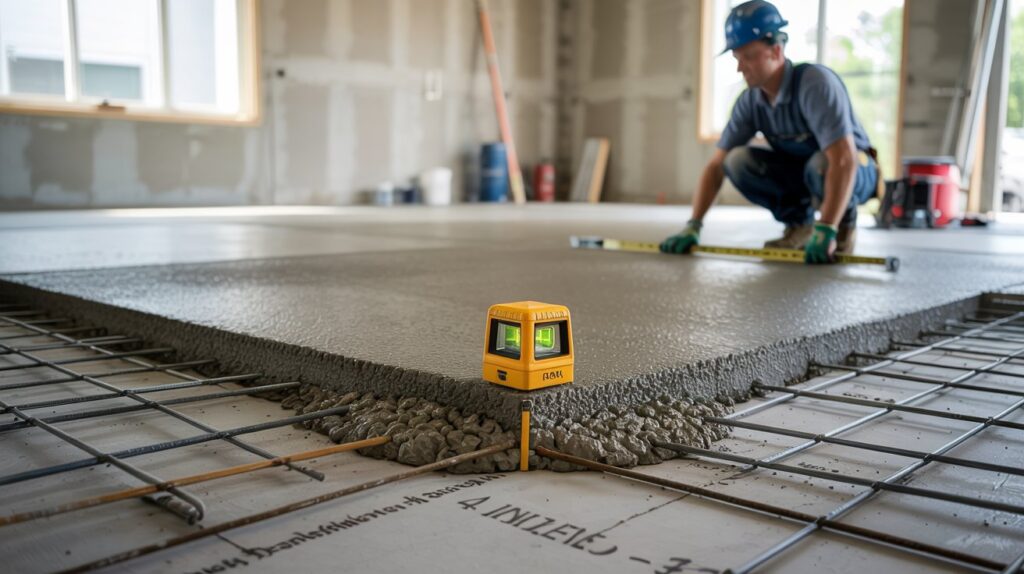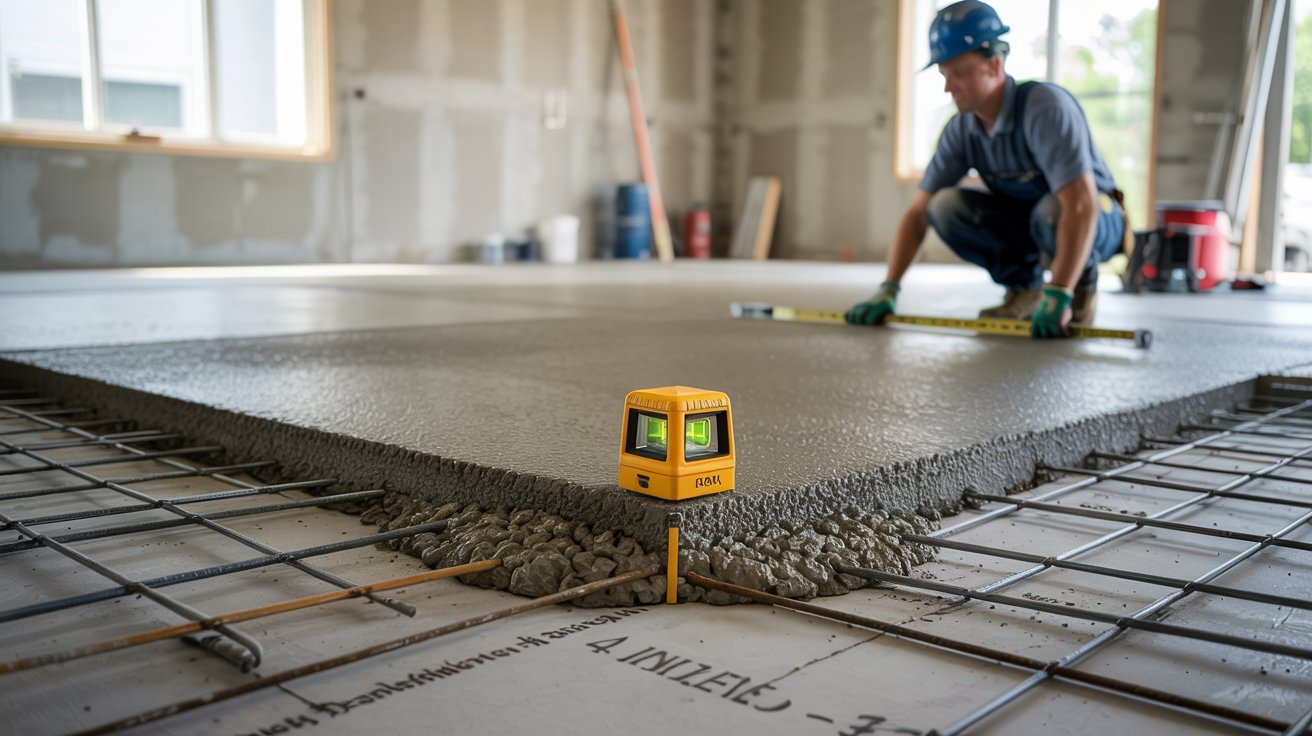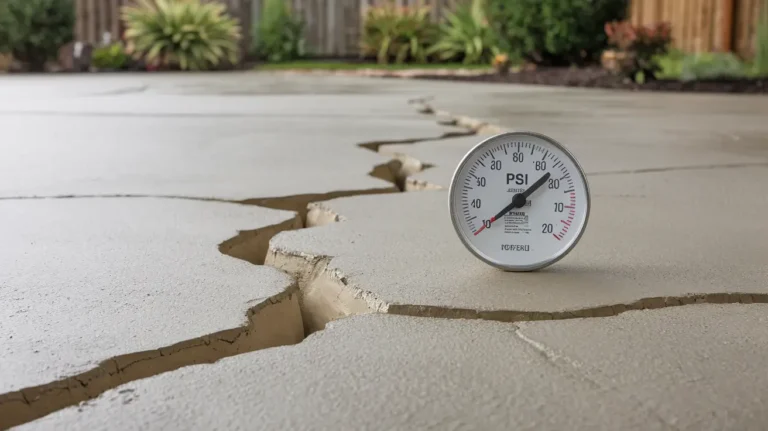Recommended Thickness for Concrete Garage Floor
When determining the recommended thickness for your concrete garage floor, consider factors like weight loads from vehicles, soil conditions, and local building codes. For typical residential garages, a minimum of 4 inches is sufficient, but increasing to 6 inches provides added durability.
Heavier equipment requires thicker floors, up to 10 inches or more. Getting it right guarantees a safe, durable surface, and understanding the nuances can save you from costly repairs down the line – so it’s worth exploring the specific requirements for your unique situation.

Factors Influencing Garage Floor Thickness
As you plan your garage construction project, determining the ideal concrete garage floor thickness depends on several key factors.
You must consider the weight that the garage will bear, including heavy loads from large trucks or equipment.
Soil Conditions also play a critical role, as unstable or expansive soils can affect load distribution and put additional stress on the garage floors.
The thickness of a concrete garage floor must be sufficient to support these loads and guarantee durability and longevity.
Proper thickness is also essential for resistance to cracking, which can lead to expensive repairs down the line.
Understanding the Importance of Concrete Thickness
You’ve likely given considerable thought to the factors influencing your garage floor’s thickness, from weight loads to soil conditions.
Now, to guarantee a durable garage, you must comprehend the importance of concrete thickness in making certain a durable garage.
A thicker concrete garage floor provides better resistance to cracking, settlement, and other damage that can occur over time.
- A minimum thickness of 4 inches is usually sufficient for typical residential garages, but heavier vehicles require thicker floors.
- Increasing the thickness from 4 to 6 inches provides added durability and support for heavier equipment at a relatively low cost.
- A thicker concrete garage floor offers better resistance to cracking, settlement, and other damage.
- The American Concrete Institute recommends a minimum thickness of 4 inches, but local building codes and regulations may vary.
- A thicker slab makes certain a durable garage floor that can withstand heavy vehicles and equipment.
Types of Concrete for Garage Floors
Concrete mixes for garage floors are formulated to meet specific performance requirements, particularly regarding strength, durability, and resistance to various forms of damage.
As you plan your garage, you’ll want to ponder the ideal thickness of the concrete to guarantee a long-lasting garage that can withstand heavier loads.
For residential garages that accommodate larger vehicles, a thicker concrete floor is necessary. You’ll need to discuss your specific needs with a concrete contractor to determine the best type of concrete for your garage.
They can help you choose a mix that meets the required strength and durability standards for your garage’s intended use. This will guarantee you get a garage floor that can handle the weight and traffic you expect, while also providing a smooth, even surface.
Recommended Thickness for Different Vehicle Weights
When planning your garage, determining the ideal thickness of the concrete floor is essential to guarantee it can support the weight of your vehicles.
The thickness of the floor will depend on the type and weight of vehicles you plan to store.
- For light vehicles, a minimum concrete garage floor thickness of 4 inches is typically recommended.
- Medium-weight vehicles require a concrete garage floor thickness of at least 5 inches.
- Heavy vehicles necessitate a thicker concrete garage floor, typically ranging from 6 to 8 inches.
- The American Concrete Institute recommends a minimum concrete garage floor thickness of 4 inches for residential garages.
- The thickness of the concrete garage floor may need to be adjusted based on the type of vehicles to be stored, with some heavy-duty vehicles requiring a floor thickness of up to 10 inches or more.
Benefits of a Well-Constructed Garage Floor
As you invest in a garage, a well-constructed floor is crucial to reap long-term benefits, including cost savings, enhanced safety, and increased property value. A thick, well-constructed floor plays a significant role in ensuring the structural integrity of your garage. Factors such as minimum thickness, building codes, and expansive soils affect the thickness requirements of your garage floor.
| Benefits | Description | Importance |
|---|---|---|
| Cost Savings | Reduces need for frequent repairs and maintenance | High |
| Enhanced Safety | Provides a secure surface for parking and storing items | High |
| Increased Property Value | Enhances the overall value of the property | Medium |
| Durability | Requires less maintenance and repairs over time | High |
| Support | Withstands heavy burdens and traffic | High |
A leveled and compacted floor is essential for ensuring the longevity of your garage. In areas with expansive soils, you may require a thicker slab to support the weight of your vehicles and stored items.
Frequently Asked Questions
How Thick Should a Concrete Floor Be in a Garage?
When building a garage, you’ll want to guarantee your concrete floor is thick enough to support your vehicles; consider a 4- to 6-inch slab with proper slab reinforcement, floor insulation, and concrete curing for a durable, long-lasting garage flooring that can withstand heavy use.
Do I Need a 4 or 6 Inch Concrete Slab for a Garage?
You’re building a garage, and you’re wondering if a 4-inch or 6-inch concrete slab is the way to go. Don’t skimp on durability – a 6-inch slab with proper reinforcement, insulation, and sealing will give you a rock-solid foundation for your garage construction, ensuring a lifetime of trouble-free use.
Is 3.5 Inches Thick Enough for a Concrete Slab?
You’re considering a 3.5-inch thick concrete slab, but it may not be enough; it can lead to concrete cracks, requiring frequent slab repair and floor maintenance, and compromising floor insulation, slab finishing, garage organization, floor painting, epoxy coating, and concrete sealing.
How Much Weight Can a 4 Inch Concrete Slab Hold?
You’re wondering how much weight a 4-inch concrete slab can hold? The answer depends on its concrete strength, slab durability, and weight capacity. A well-designed mix with proper finishing techniques, curing methods, and reinforcement materials can support up to 10,000 pounds per square inch, but it’s not that simple.
Conclusion
In the end, a well-constructed garage floor is the foundation of a safe and durable space for your vehicle. Like a solid anchor, a thick concrete slab holds firm against the wear and tear of daily use, protecting your investment from cracks and damage.
By considering the factors that influence thickness and choosing the right type of concrete, you can build a garage floor that’s as strong as a rock, providing years of trouble-free service.






